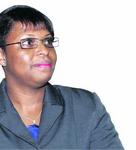Arthur Hall, Senior Staff Reporter


Left - Mowatt: We have bought the most advanced technology available and this should be in place by the end of the summer. Right - Golding ... has announced plans to allow the taking of non-invasive DNA samples and the establishment of a DNA database
THE GOVERNMENT'S Forensic Laboratory is improving its technology to deal with the expected increase in requests for DNA tests under the latest anti-crime plan.
On Tuesday, Prime Minister Bruce Golding announced plans to allow the taking of 'non-invasive' DNA samples and the establishment of a DNA database as part of efforts to help the police identify and secure the conviction of criminals.
This has been applauded by the police who have long argued that a DNA database would allow them to restrict hardened criminals responsible for the majority of serious crimes across the island.
Many cops worry that the local Forensic Lab might not be ready to analyse the hundreds of DNA samples which will be placed in the system.
But administrators of the Forensic Lab say they will be ready.
"We have bought the most advanced technology available and this should be in place by the end of the summer," said head of the Forensic Lab, Dr Judith Mowatt.
According to Mowatt, a new DNA unit has already been outfitted and for the last couple of weeks, engineers and instructors from overseas have been in the island conducting training.
Fast-forward investigations
DNA testing is not new to Jamaica, but Mowatt said the new state-of-the-art equipment should allow the lab to quickly conduct DNA tests.
"We haven't worked out the throughput yet until we start running the samples on the equipment, but what we have been able to do is automate all the stages. We have been doing DNA testing, but we are going to upgrade and modernise the way we do it."
Currently, the Forensic Lab takes hours to run the samples to separate the different markers to determine the DNA, but under the new system, the samples will be done in 30 minutes.
That should put Jamaica in the league with North America and parts of Europe, where DNA testing is an important part of crime-fighting measures.
Could aid in old cases
In the United States, the system has DNA samples of more than four million persons who have been arrested for crimes.
In addition, DNA samples from suspects in some cases have resulted in the discovery of the perpetrators of several other crimes.
That is a line pushed by local policemen and women who have long campaigned for a DNA database.
They point to Britain where the practice of retaining DNA profiles of persons charged for crimes, even if they are acquitted, has resulted in thousands of persons being convicted for other crimes.
With the DNA database established in Jamaica, hairs from a brush, blood on clothing, saliva on a cigarette or semen on a bed or a body could go a long way in proving someone's guilt.
In the US, the Combined DNA Index System made matches that caught criminals in more than 50,500 cases in the first six years.
In the UK, the introduction of a DNA database resulted in an increase in the average clear-up rate for detectives from 24 per cent to 43 per cent in one year.

